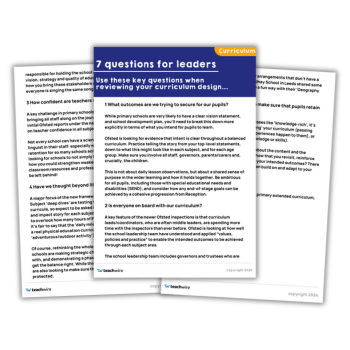Ofsted – One-word judgements, HCMI expertise & more

We delve into the multifaceted world of Ofsted, exploring how it needs to improve, the expertise we expect from HMCI and the mechanisms in place for inspecting inspectors…

- by Teachwire
- Classroom expertise and free resources for teachers

What changes does Ofsted need to make?
If the teacher feedback from several recent listening exercises is any indication, there’s a growing desire for Ofsted to change in some fairly fundamental ways, observes Adrian Lyons…
In March 2024, Ofsted embarked on an ambitious listening exercise named ‘The Big Listen’. Its aim was to engage educators, school leaders and stakeholders across England.
While Ofsted positioned the consultation as a bold initiative, many questioned whether Ofsted had structured it to sidestep deeper, more fundamental questions.
Alongside the publication of Ofsted’s response the following September, an independent response emerged. This was aptly titled the ‘Alternative Big Listen’ (ABL).
It was conducted by two former senior HMIs (Frank Norris and Professor Colin Richards), with the support of other former HMIs – including me – and educational experts.
The ABL surveyed over 1,300 individuals in the education sector. It has provided compelling insights that call for urgent, systemic change in Ofsted’s approach to inspection.
Some of its findings were stark. 91% of respondents felt that Ofsted was ‘not fit for purpose’. 90% perceived inconsistencies in inspections across different regions.
As those overseeing the ABL noted when unveiling their final report, “Ofsted has lost very significant levels of trust and confidence.”
The survey further highlighted how 85% of participants disagreed with the notion that the proportion of schools graded Good or Outstanding accurately reflects the quality of the system as a whole.
Additionally, 83% of respondents supported a moratorium on routine inspections. Instead, they emphasised the need for a comprehensive review before continuing with the current inspection model.
These statistics reflect a shared concern. Is Ofsted measuring the right metrics, and is it doing so fairly and effectively?
Greater sensitivity
Alongside the release of its Big Listen report, Ofsted also published a review by former Chief Inspector Dame Christine Gilbert. This examined Ofsted’s response to the tragic circumstances surrounding the inspection of Cavendish Primary School.
The inquest into the incident highlighted concerns around the conduct of that inspection. It was found to have contributed to the distress and subsequent death of the school’s headteacher, Ruth Perry.
The review detailed how Ofsted’s current leaders responded by attempting to instil a culture of greater sensitivity. It required all inspectors to regularly check in on the wellbeing of headteachers. (This was a practice that effective inspectors were routinely performing already.)
Dame Christine’s report did, however, raise broader concerns surrounding Ofsted’s governance – particularly the limited role of its non-executive board in critical decision-making.
She noted that HMCI is not fully accountable to the board, and that the board lacks control over Ofsted’s budget.
This financial constraint has driven a high-volume ‘dominant inspection’ approach. This has in turn led to rapid staff turnover and a lack of experience among inspectors.
It surely can’t be right that Ofsted’s governance is less robust than the expectations placed upon on the schools it inspects?
Score cards
These reports were all published in early September 2024. They were thus, to some extent, overshadowed by the government’s announcement that ‘Overall effectiveness’ grades for state schools would no longer form part of Ofsted’s inspections, with immediate effect.
From September 2025, Ofsted reports will have evolved into ‘score cards’. Teachers have generally received this as a positive move.
It may well be. However, I do worry that we may end up with something akin to inspection reports as they existed around 2010.
Back then, many worthwhile judgements were required around the ‘Every Child Matters’ agenda. As schools were being judged on the ECM agenda, they had an accountability incentive – which was great.
Sadly, however, inspections lacked the resources to make anything like the 31 judgements required for a secondary school with a sixth form. Consequently, many of the sub-judgements lost any meaning.
As a specialist HMI at the time, my own analysis showed that unless the inspection was led by a member of the economics, business and enterprise team, the judgement on ‘The extent to which pupils develop workplace and other skills that will contribute to their future economic wellbeing’ would invariably be identical to the judgement for ‘Pupils’ achievement’.
Unless something more fundamental changes at Ofsted, score cards may not be the panacea that many seem to be hoping for.
I know that when in opposition, the Labour Party had been thinking about them. I just hope that Bridget Phillipson comes up with something more original than simply letting Ofsted tinker with its existing framework once again.
Adrian Lyons was one of His Majesty’s Inspectors between 2005 and 2021 and now works with MATs, teacher training providers and LAs to support education.
What has Ofsted learnt in the wake of Ruth Perry’s death?
Following Ruth Perry’s death, Ofsted has resolved to inspect schools differently – but has the regulator learned the right lessons?
At the start of January 2024, Ofsted announced it was suspending its inspections (although not in early years settings, for reasons unclear). This was so inspectors could complete mental health training.
This move followed the high profile and tragic death of Ruth Perry – a headteacher whose suicide was deemed by senior coroner Heidi Connor to be at least in part the result of a negative Ofsted ruling her primary school had received.
Systemic issues
Inspectors attended a half-day online mental health seminar later that month. This included awareness training provided by Mental Health First Aid England.
Inspections then resumed before the month was out. This was alongside what was – rather condescendingly – dubbed the ‘Big Listen’, whereby Ofsted sought feedback from educators and parents on how it could improve.
Look, I’m all for more people receiving mental health first aid training. Indeed, I’m the co-founder of a campaign called Where’s Your Head At, which calls for parity between mental health and physical first aid provision within all workplaces.
Where correctly applied, I have no doubt that the skills delegates learn on such courses have the power to save lives.
And yet, I can’t help but feel that there’s been more than a hint of gimmickry surrounding this exercise, coinciding as it did with the arrival of new HMCI, Sir Martyn Oliver.
And it’s not just me. NEU general secretary Daniel Kebede told The Guardian, “Ofsted is prioritising fanfare for the new chief inspector over the wellbeing of school staff.”
It’s all infuriatingly symptomatic of the ‘firefight the symptom, rather than address the cause’ strategy I’ve often observed when organisations attempt to tackle mental health concerns.
In her report, Heidi Connor noted that Ofsted’s role in Perry’s death couldn’t be attributed to the actions of any one individual inspector.
This would suggest that the issues involved were systemic, rather than interpersonal. The real problem is the way in which Ofsted operates. No amount of training inspectors in spotting symptoms of mental ill health among staff during visits (however sensible this is, generally) will manage to address that.
Punitive ineffectuality
To anyone working in education, this will come as no surprise. Since Michael Gove’s sweeping reforms starting in 2010, Ofsted has become ever more punitive, yet less effective in fulfilling the role for which it was ostensibly created – namely holding schools to account in a transparent way. Instead, it’s helped contribute to a worsening of staff morale and wellbeing across the teaching profession.
Concerns
Whilst researching this article, I invited school staff to contact me anonymously if Ofsted had ever negatively impacted their mental health. I was inundated with responses. Staff consistently cited the same concerns, namely:
- The length of time leading up to possible inspections, causing them to hang over schools like a dark cloud, sometimes for up to months on end
- SLTs making unreasonable demands in the run-up to inspections, amid insistences that ‘Ofsted will be looking for this’
- No one knowing if such demands are legitimate, given the inspection framework’s lack of consistency. The same actions earning praise in one school can be overlooked or even criticised in another.
- A persistent sense that that inspectors are there to ‘catch teachers out’, rather than help them improve.
- A teacher’s entire job being summed up in a one-word grading, with all the high stakes that accompany that (Ruth Perry was reportedly worried about the impact of her school’s Ofsted rating on house prices in the local area).
One school governor additionally told me that inspectors had failed to take into account the extra pressures schools faced as a result of the near total decimation of external social and health services in some local areas, as well as COVID.
In light of all this, as former Ofsted Inspector Julie Price-Grimshaw told me on my LBC show, “Having a smiling assassin isn’t going to make a difference.”
Natasha Devon is a writer, broadcaster and campaigner on issues relating to education and mental health; to find out more, visit natashadevon.com or follow @_NatashaDevon.
What experience and expertise should an HMCI have?

Adrian Lyons ponders the qualifications and characteristics needed to thrive in the role of HMCI…
In the complex landscape of England’s education system, His Majesty’s Chief Inspector (HMCI) holds a pivotal role in setting Ofsted’s policies and priorities.
Importantly, while we consider most Ofsted employees civil servants, HMCI is not. Instead, HMCI holds the unique position of being a ‘Crown appointment’. This makes it very difficult to remove an HMCI once you’ve appointed them for their five-year term.
This is something which has previously been, and could well be again, problematic when governments change.
Checks and balances
As the former HMI senior manager Frank Norris has argued, an updated inspection framework is generally much more effective at delivering change across the education system than any Act of Parliament – yet a change in the inspection framework happens entirely at the whim of HMCI, with no checks or balances in place.
In this sense, Ofsted operates more as an autocracy than a collective of professional experts. And within Ofsted itself, there tend to be few opportunities for speaking truth to power.
During my tenure as an HMI, I served initially under Sir David Bell. He began his career as a primary school teacher before later becoming a headteacher.
A large LA subsequently appointed him as a director of education and libraries. He was then chief executive of Bedfordshire County Council.
Dame Christine Gilbert succeeded him. She had previously been a secondary history teacher and headteacher. She was then a successful director of children’s services in Tower Hamlets and latterly that borough’s chief executive.
As HMIs, both possessed extensive experience of school leadership, combined with high level skills at running an extensive bureaucracy. Prior to being appointed as HMCIs, both also had connections to the governing Labour party of the time.
Standards and behaviour
Following the Conservative-led coalition victory in 2010, incoming Education Secretary Michael Gove was keen to remove Christine Gilbert.
Her inspection framework was steeped in the ‘Every Child Matters’ agenda, which he detested. I remember encouraging her to stay in post, but by 2012 her time was up. She was replaced by someone else with a successful record as a headteacher – Sir Michael Wilshaw.
Sir Michael had gained his knighthood for the impact he’d had in improving a London secondary school. He then went on to establish a school in Hackney where he stayed as leader for seven years, witnessing pupils from his original Y7 graduate Year 13 and enter some of the country’s most prestigious universities.
He had a reputation for firm discipline, and became known as ‘the Sergeant Major’. Gove concluded that this was precisely the skill set you need to be HMCI. The new HMCI thus emphasised ‘standards’ and ‘behaviour’ during his tenure, just as the government had hoped – but he also turned out to be fiercely independent.
Gove’s special advisor at the time – one Dominic Cummings – even briefed against HMCI, leading to a public showdown that Sir Michael eventually won. Yet despite bringing considerable educational expertise to the role, Sir Michael’s comparative lack of high-level experience in local government or administration proved frustrating.
Gaps in experience
Sir Michael Wilshaw’s term came to an end in late 2015, much to the DfE’s relief, whereupon Ministers resolved to not make the same mistakes again. So it was that the then Secretary of State for Education, Nicky Morgan, appointed Amanda Spielman to the role, whose professional background was in accountancy and finance.
At the time, the Conservative-dominated Education Select Committee voiced ‘significant concerns’ over her suitability for the job – chief among them, her lack of teaching experience and failure to demonstrate understanding of the ‘complex role’.
The appointment of Sir Martin Oliver as HMCI, who assumes the role in January 2024, will thus see a return to an individual with considerable school leadership experience running Ofsted. Though like his predecessors, he will be leading an inspectorate without having had any personal inspection experience.
The Education Select Committee heard during his pre-appointment hearing that he was keen for his own school leaders to be part-time inspectors, but that he himself had been ‘Too busy improving schools’.
In common with my former HMI colleagues, I believe that if there’s one key gap in the CVs of Ofsted’s last few HMCIs, a lack of inspection experience would be it.
Who inspects the inspectors?

Given the increasingly fractious relationship between the profession and Ofsted, Adrian Lyons asks, ‘Quis custodiet ipsos custodes…?’
Lead Ofsted inspectors have immense power and responsibility during inspections. During my time as an HMI, my colleagues and I often discussed the huge authority we had when in schools. Yet this power isn’t entirely unconstrained.
The key way in which we marshall inspectors is via the inspection handbook. Grading must always be justified against the criteria it sets out. The first question to therefore ask when reading a report for quality assurance purposes is ‘Does the text justify he grade?’
Selective evidence
That said, it’s possible to be highly selective in the evidence you record, in order to justify the final grade. Ofsted is very hot on ensuring that reports meet a fixed set of writing requirements. In reality, however, for most inspections Ofsted only checks the report writing, not the actual gathering of evidence.
The main purpose of Ofsted’s training is to disseminate central messages. This is so that it can maintain consistency in how we carry out inspections.
This results in enormous, centrally-produced slide packs. One very experienced HMI once described in-person Ofsted training to me as ‘A long session where we’re talked at non-stop from 9am to 4pm, with just a quick comfort break at lunchtime.’
Quality assurance
Occasionally, inspections will receive a quality assurance visit from an HMI (or a more senior HMI if it’s an HMI-led inspection). This is usually to ensure that the lead inspector has followed the pre-inspection guidance set out in the inspection handbook.
A quality assurance inspector will check that evidence base is evaluative, and closely follows the methodology for gathering and recording evidence, as set out in the inspection handbook.
They will judge this by looking at the evidence recorded by inspectors, speaking with inspection team members and interviewing the headteacher about the inspection’s progress. They will also check that inspectors are following the prescribed methodology, with the requisite number of ‘deep dives’.
A judgement will then be made as to whether the lead inspector’s ‘Integrity, professionalism and thoroughness strongly reflect Ofsted’s values and code of conduct.’ However, given that key strategic priority for Ofsted at the moment is for ‘Lead inspectors [to] contribute to achieving the 2023/24 corporate volumes’, relatively few such quality assurance visits are actually taking place.
Ofsted’s culture of conformity
Then there are the contracted inspectors. HMI monitors their work largely through checks of their reports and occasional on-site visits.
Again, though, a contracted inspector’s work will be largely assessed on the basis of their report writing alone. Hence the somewhat formulaic nature of Ofsted’s school reports.
If your continued allocation of work depends upon the conformity of your report writing, then there’s little incentive to inject any personalisation.
Ofsted inspectors are effectively on ‘zero hour’ contracts. So the easiest way of managing a given inspector’s poor performance is to simply not allocate them any further work.
“Ofsted inspectors are effectively on ‘zero hour’ contracts”
The primary incentive for inspectors is to thus play it safe – by deciding on your judgement, and then ensuring that your final report only mentions that which supports said judgement. There is no room for nuance.
Working relationships
Of course, the human factor of inspections produces a degree of subjectivity. This is where Ofsted’s command and control approach comes in. Ofsted’s priority is consistency, but professional relationships between inspectors and school staff can be difficult to control.
Ofsted’s code of conduct states, “It is important that inspectors establish and maintain a positive working relationship with providers, based on courteous and professional behaviour. Inspectors will take all reasonable steps to prevent undue anxiety and to minimise stress during the inspection or regulatory activity.”
If that isn’t happening, then filing a post-inspection complaint will be too late. Immediately raise any concerns with the lead inspector, and if you’re still unsuccessful, contact your nearest Ofsted regional office.
Adrian Lyons was one of Her Majesty’s Inspectors between 2005 and 2021. He now works with MATs, teacher training providers and LAs to support education. Find out more at adrianlyonsconsulting.com










